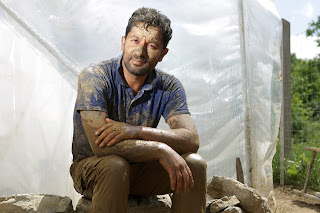Sometimes something in the news hits hard, like a stab in the heart or punch in the gut. In these turbulent times, especially in our own country regarding racism, prejudice and downright hatred, I think this story of one man trying to make right the injustices in his own town, hits close to home. When I first read the story last week I wept, perhaps not tears, but something deeper in my soul, and everyone I showed the article to had the same reaction.
LASZLO BOGDAN was the 46 year old mayor of Cserdi , Hungary
Laszlo (Laci) was a man driven by a strong sense of personal responsibility as he organized the life in his small town,setting up work programs, eliminating crime, caring for the poor, building parks and green areas for all. His success was dubbed the ‘Cserdi miracle’.
In 2020, along with Gábor Iványi and Jenő Setét, he received the Wallenberg Prize, for ‘setting an example for humanism’ and his contribution to ‘peaceful coexistence of minority and majority society’.
When asked about his success he replied: “It is difficult to determine what is the measure of credibility. I am neither the Dalai Lama, nor am I a Pope Francis…I merely try to offer sober messages and goals, so that people might understand that there is hope, not everything is lost.”
In a tribute on Facebook, Mayor of Budapest, Gergely Karácsony recalled “the last time I was in Cserdi, I got a beautiful photo from Laci. The photo shows the oldest citizen of Cserdi, a beautiful elderly Romani woman. He said he was giving me this photo to always remind me that only very rarely do Roma live to such a beautiful age, and carry a lot of burdens even during their shorter lives. László Bogdán, the mayor of Cserdi, carried these burdens and more. His own, those of his village, and even the common burdens of all of us: poverty, exclusion, futility, dogmas.”
Even Opposition leaders respected the man and mourned his loss. Klára Dobrev described Laci as a role model: “The calm, soft-spoken man radiated strength, good sense of conscience, and a belief that it was worth fighting for. I learned a lot from him.” Another leader, described his loss as a tragedy: “There is one less among those who want to bring peace and cooperation between Roma and non-Roma … without László Bogdán, there is one less proof that it is possible to run a settlement in such a way that everyone feels at home, regardless of skin color.” To ensure the legacy of László Bogdán does not pass, she called on all in public life to take responsibility to fight against exclusion, disadvantage, and domination: “It is a common tragedy that we have to continue this work without László Bogdán.”
Those close to him said that he was not ill, or at least had not spoken to anyone about health issues. He was full of plans, saw himself as an ambitious public figure with a promising future, a view shared by many across the country, including parliamentary parties who wanted him on their national lists for the next general election in 2022.
With so much to look forward to it in hard for anyone who knew this brave man to know why he took his life. Perhaps he felt the future was hopeless- that he was not doing enough, fast enough. Certainly anyone who experiences racism and discrimination as a part of their daily life, is vulnerable, but to take on a whole village?
His name, Lazslo means “glorious ruler”. May the man who tried to better the lives of his people find peace in the Lord and may the "Gypsy" St. Ceferino Giménez Malla (also known as El Pelé, "the Strong One") patron saint of Romani people, greet him with open arms!
 |
| St. Ceferino |

